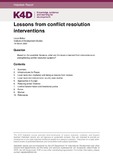Lessons from Conflict Resolution Interventions
Abstract
The following report is a rapid review of a broad literature on conflict resolution systems and peacebuilding. Section 2 discusses the concept of Infrastructure for Peace (I4P), setting up of functional structures for successful and sustainable peace. I4P can be either bottom-up or topdown and take many different forms. Areas of support suggested for these structures includes: executive leadership; rule of law and law enforcement; fiduciary management; public administration; security; and natural resource management (Giessmann, 2016). Section 3 reports evidence from reviews on local peace committees (LPCs), which can be formal or informal. Informality has the benefit of allowing creativity, but can be insufficient in reaching powerful political leaders. Formal local peace committees are linked to national agendas. This ensures information flows and removes political blockages, but can be restrictive and corrupted by local power-plays. Local buy-in is particularly important in more formal committees, and must be supported by a functioning peace architecture. Recommendations for successful peacebuilding are drawn from the country case studies (section 4), approaches in Europe (section 5), and learning from Christian Aid programmes (section 6). These reiterate lessons from the reviews. They suggest: involvement of local leaders, Local Councils, and community members; factoring in time for results and accepting the continuous nature of a peace process; providing sufficient resources; encouraging the role of women; focus on long-term objectives for sustainability; pacts need to continue with dialogue; understanding and using mediators; building trust with outside actors, and connection between different levels (local, national, regional) and between state and non-state. Potentially relevant lessons from a review on reducing armed violence are described in Section 7. Section 8 touches on the role of police institutions with an example of community policing in Bougainville. And Section 9 begins to explore the involvement of women in conflict resolution. All of these sections require deeper analysis outside the scope of the helpdesk.
Citation
Bolton, L. (2020). Lessons from conflict resolution interventions. K4D Helpdesk Report 782. Brighton, UK: Institute of Development Studies.Is part of series
K4D Helpdesk Report;782Rights holder
© DFID - Crown copyright 2020Collections
- K4D [937]

